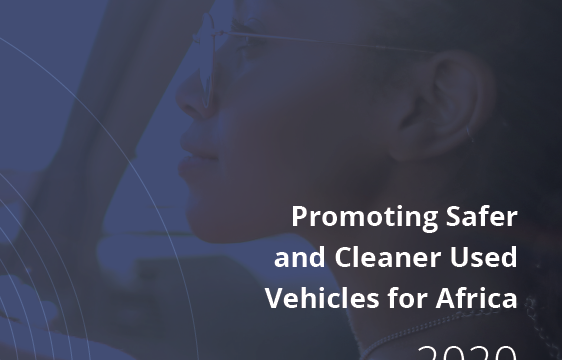
A recent study by the Automobile Association of South Africa (AASA) – funded by the Fédération Internationale de l’Automobile (FIA) Region I – has revealed that the unregulated importing of cars in many African countries has a negative impact on the continent’s environment, health, society, and economy.
The Promoting Safer and Cleaner Used Vehicles for Africa 2020 Report raises awareness on the necessity for promoting a safer and cleaner market for used vehicles in Africa. It was conducted in support of the United Nations Environment Programme’s (UNEP) project which seeks to regulate the export and import of used vehicles in Africa.
UNEP’s project will bring exporters (mainly from the European Union and Japan) and African importing countries together to agree on minimum standards for used vehicles. It also seeks to support African countries develop national standards and regulations in relation to emissions and safety.
Among the findings highlighted in the Promoting Safer and Cleaner Used Vehicles for Africa 2020 Report are that 22 African countries currently have no restrictions on the importing of second-hand vehicles, while 27 countries have age limitations of between three and 15 years on the vehicles they are importing.
The report provides a country synopsis of the situation in each African country outlining, amongst others, current legislation regulating the importation of vehicles, the number of used vehicles (where the data are available), the number of road crashes in each country (again, where the data are available), and recorded deaths per 100 000 of the population due to ambient air pollution.
The report also considers, for instance, the social impacts of importing second-hand vehicles onto the continent. For example, an important social impact is the direct connection between poor quality second-hand vehicles and the number of road deaths in many countries. Similar conclusions relating to the economy and environment are included.
Issues relating to the challenges of policy changes, as well as policy suggestions in respect of importing second-hand vehicles are included in the report.
“The data points to a need for more action in both receiving and sending countries, even if the challenges are widely different. As automobile clubs in Africa, we are there to assist in dealing with these challenges as we have the technical knowledge, and can offer services for second-hand vehicles,” says Laurianne Krid, Director General FIA Region I.
FIA Region I, together with all members of the African Council of Touring and Automobile Clubs (ACTA), is using the data collected through the study to call on importing and exporting countries to take action to promote safer and cleaner used vehicles for sale in Africa. In particular, the clubs would like to see the following in relation to the importation of second-hand vehicles:
“A common approach and the implementation of a good labelling system should allow us to improve record-keeping, we acknowledge that we should be cautious in our approach so as not to incur potential negative unintended consequences. Among these is preventing second-hand vehicles which are safer than new vehicles, from entering the African market,” concludes Krid.
About FIA Region I
The FIA Region I office, based in Brussels, is a consumer body comprising 105 Mobility Clubs that represent over 35 million members from across Europe, the Middle East and Africa. The FIA represents the interest of these members as motorists, public transport users, pedestrians and tourists. The FIA’s primary goal is to secure a mobility that is safe, affordable, sustainable and efficient. With these aims in mind, FIA Region I’s work focuses on Road Safety, Consumer Protection, Environmental Protection, and the promotion of Sustainable Motoring. www.fiaregion1.com
Contact
Valentina Ferrara
Communications Manager, FIA Region I
vferrara[at]fia.com
+32 2 282 0813
About The Automobile Association of South Africa
The Automobile Association (AA) has been the trusted champion of the South African motorist and traveller for over 85 years. Along with our AA Accredited Sales Agents located countrywide, the AA offers access to over 50 benefits on 1 card as well as other travel and mobility services that extend far beyond 24-hour roadside assistance – from technical and legal advice, to emergency rescue services, roadside security and a mobile app suite. The AA offers specialised apprenticeships to help motor industry players build in-house skill, and short skill courses for individuals.
For more information please visit www.aa.co.za or aasa.mobi, or contact:
Layton Beard
Automobile Association of South Africa (AA)
AA Public Affairs
011 799 1126 or 083 386 6954
press@aasa.co.za
ACTA Clubs